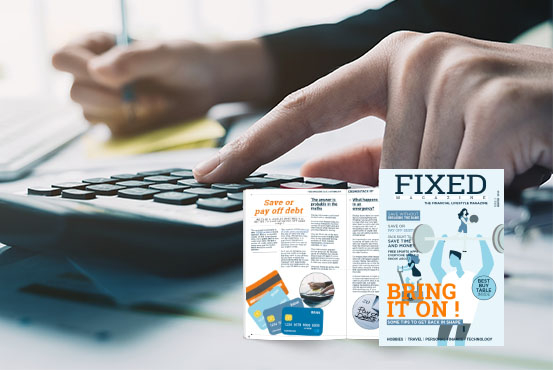
Save up or pay off debt?
The average household is over £15,000 in debt a record amount. Whilst a sizeable chunk of this is mortgage debt, but a great deal is also credit card debt. We are a nation of credit users, and some may say the better word would be credit abusers. This summer (2019) the use of credit cards outstripped the use of cash for the first time. Whilst this may not be surprising, it is significant because it illustrates just how much we have come to rely on our credit cards.
So if you, or someone you know, has credit card debt that they want to pay off how do you best achieve this whilst looking after all of your finances? And specifically, what are you supposed to do first – pay of debt or save up?
The answer is probably in the maths
The key information you’ll need to start with is interest rate.
Look at what interest rate you are being charged to ‘borrow’ money on your credit card, and then look at what interest rate you are offered for saving. You can find a list of the best savings accounts, including cash ISAs, in the personal finance sections of most Sunday newspapers, comparison websites, or here.
The mathematics appears at first glance to be the best guide to whether you should save or pay off debt: if you’re paying more to borrow money than you’re making by saving it, then pay down your debts.
However, there are some other factors to consider too.
What happens in an emergency?
Paying down debt can seem like an overwhelming task. Whether you’re just trying to clear that ‘buy-now-pay-later’ deal you got when you bought your new sofa, or struggling to get on top of years-worth of credit card use, you can easily become disheartened.
It’s important to see progress in paying off debt, which is why you need to pay more than the minimum payment each month so you can gain encouragement from seeing the debt reduce.
So imagine then what happens when an unforeseen expense occurs. Maybe the washing machine packs up, or the car goes in for a service and comes back with a long list of things that need doing to keep it on the road.
In these instances it might pay to have squirreled away some cash so you don’t have to get the credit card out again. Seeing the balance increase can be demotivating and disincentivise you in your quest to paying off your debts.
Prioritise your finances
It stands to reason that you need to clear the debts that are costing you the most first. In practice this probably means credit card or store card debt because they can charge the most crippling rates.
However, one way to side step this necessity so that you can also prioritise saving, is to look for 0% balance transfer offers. This means you can port across balances currently on credit or store cards that are costing you a lot of money in interest payments, to another card where you pay less or nothing at all. The key is you need to cut the new credit card up as soon as you receive it in the post so you aren’t tempted to use it. And make sure you close your old accounts so you aren’t tempted to rack up more debt once you’ve cleared them.
If it is not possible to get another credit card, it’s worth speaking to your bank about whether they will offer you a loan to cover your debts. If you’ve been a loyal customer with a good track record over a number of years your bank may well be willing to give you a small loan so you can consolidate your debts into one place and that the interest rate they charge will be much lower than one demanded by a credit or store card.
Despite the simplicity of this manoeuvre to reduce debt, too many people still don’t utilise this option.
Sort out your balance
Balance is probably the key consideration when thinking about saving and paying off debt.
The balance on your credit cards needs to be reduced and you achieve this by paying off what you can afford each month as well as making sure you have looked at all the options to reduce the cost of your debt.
However you also need to think about balance in terms of balancing savings with paying off debt. It can take a long time to pay debt down, but if the interest charged on your debt balance is relatively low or even zero, then it makes sense to balance this by putting something aside each month into your savings.
If you or someone you know is struggling with debt there are ways to get help and advice. Start by talking to the Citizens Advice Bureau to find out what options will best suit you.
If you’re interested in finding out more about saving and investing check out our new magazine ‘Fixed’ which has loads of tips and hints about how to save cash.
